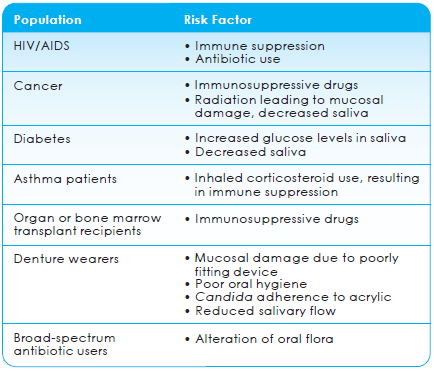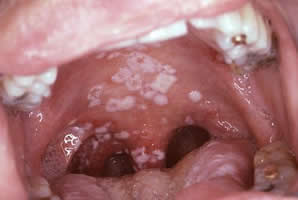Oral Thrush Causes, Signs, & Symptoms
Causes of Oral Thrush
Oral thrush can be caused by a number of factors, including certain medicines that are usually taken to treat cancer; medicines that are taken to treat infections; a cut or a lesion in the mouth that allows the fungus to multiply; reduced production of saliva; poorly fitting dentures; and poor oral hygiene.1
Oral thrush is caused by candida and does not develop into a fungal infection under normal circumstances because a healthy person’s immune system prevents Candida overgrowth. However, when a person becomes sick and starts to take certain medicines, Candida has a chance to thrive and overgrow. If you feel you may have oral thrush, it is important to consult your physician or dentist and start treatment as soon as possible.

Signs and Symptoms of Oral Thrush
The most common symptom of oral thrush is white patches on the tongue and other surfaces of the mouth. People who have oral thrush can experience other symptoms, such as pain, burning, dry mouth, pain when swallowing, soreness, and a change in the way things taste.2,3
Symptoms experienced by patients with oral thrush can lead to more widespread problems. Pain while eating, drinking, or swallowing can lead to a reduction in food consumption, which can lead to unintended weight loss and other health problems. If left untreated, oral thrush can become more serious and can affect a person’s entire body.2,3,4

Photography courtesy of Sol Silverman, Jr., D.D.S. and Centers for Disease Control and Prevention
What to Expect if Oral Thrush Develops
Your doctor can diagnose oral thrush by examining your mouth. The doctor will look for distinctive white patches in your mouth, or on your tongue or cheeks. Lightly brushing the patches away reveals a reddened, tender area that may bleed slightly.1
Oral thrush infections must be treated with prescription medication. The type and duration of treatment depends on how bad the infection is and things such as the patient’s age and how healthy their immune system is. If oral thrush is not treated, it can lead to a more serious illness.
References:
- Epstein JB. Infect Dis Clin North Am. 2007;21(2):503-522, v11.
- Coogan M, et al. Bull World Health Organ. 2005;83(9):700-706.
- Worthington HV, Clarkson JE. J Dent Educ 2002;66(8):903-911.
- Appleton SS. J Calif Dent Assoc. 2000;28(12):942-948.

